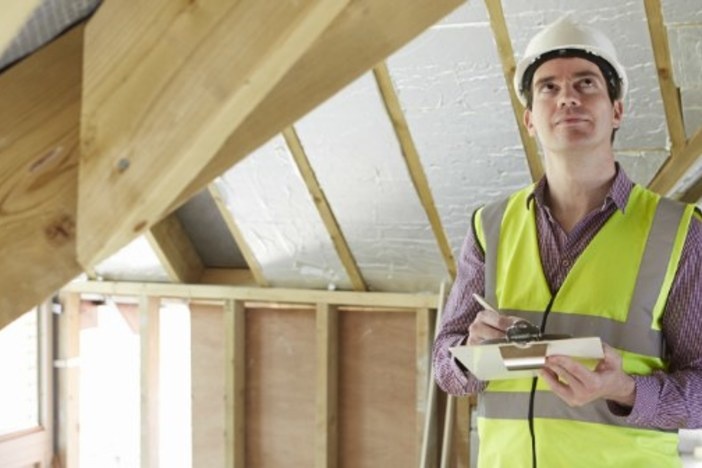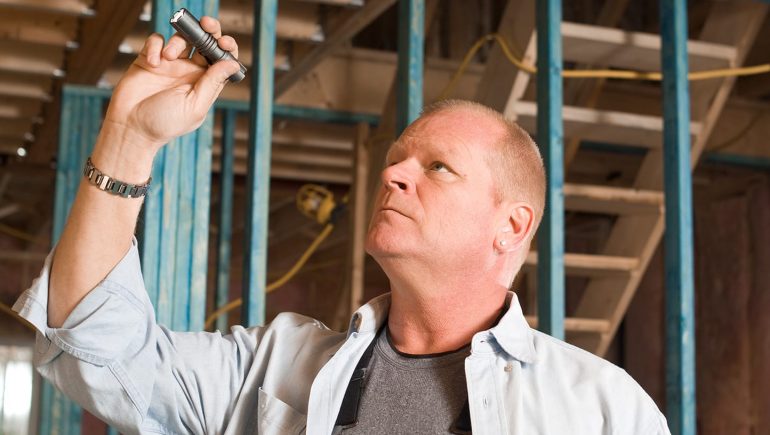How to Make the Most of Your Home Inspection
You’ve searched and searched, and you’ve finally found it: your future home. It’s perfect — at least as far as you can tell, anyhow. But while having your offer accepted will be the first official step toward homeownership, there’s another crucial step you’ll need to do before you start packing boxes and picking out paint swatches — you need to get a home inspection for your potential abode.
A home inspection may not be the most exciting way to spend a few hundred bucks, but it’s one of the smartest investments you can make. Home inspectors are trained to spot potential snags that could lead to costly repairs down the road. And if you catch those issues before you’ve moved in, you may be able to get the seller to help you cover the cost of fixing them, which could save you a lot of money in the long run. Here’s everything you need to know about getting your home inspected.
Choosing an Inspector
You may be tempted to do a DIY inspection or enlist a handy friend to scope out the house, but hiring a professional is the best bet. Home inspections typically cost between $300 and $5001, but don’t let price be your deciding factor — it’s worth paying a little extra for an experienced inspector with a stellar reputation. After all, a thorough inspection could save you thousands of dollars if a major issue turns up.
Scheduling Your Home Inspection
Your contract will most likely mention a “due-diligence period,” which is the amount of time you’re given — typically around 10 business days — to get your home inspected. That may not seem like much time, but inspectors are used to the time crunch. Just contact your home inspector as soon as possible, and try to choose a time when you’re available to tag along. You’re not required to be there, but it can be helpful to see any trouble spots in person and ask questions.
What Your Inspector Should Look For
Not only will a home inspection help you protect your investment, but it’s also a perfect opportunity to get acquainted with your future home. Your home inspector should walk around outside to make sure the foundation, roof and siding are in good shape and water drains away from the house. Inside, they should check the plumbing, test the outlets, open and close every window, heat up the oven, run the air conditioning, inspect for evidence of termites, look for any ventilation issues and more.

Hiring a home inspector? Here are things to remember
The more she looked for problems, the more she found them. Studs had rotted. The one wall in the basement that was covered in drywall when she bought the house turned out to be in even worse shape.
It was only the beginning. A contractor started to repair the foundations and vanished, but not before starting a fire which made the house uninhabitable. Marchuk successfully sued him, but the settlement is coming in slowly on an installment plan.
“When I listed it in in 2013, somebody was interested, and got a home inspection with a different company. He said the house was shifting — you can tell by the roof that it’s kind of caving in on one side. The two inspections, if you compare them, are just night and day. Theirs was more thorough, and had drawings of how the house was shifting, and that the foundation is failing, which that home inspector could see, because we were disclosing that there were these massive cracks in the basement, which the other inspector didn’t know. He said that even the siding was buckling, and you could tell that something was going on with the house because of the way all this stuff was.”
Because they’re not allowed to cause damage, the best inspector can miss serious problems.
“The biggest thing confronting me is that I’m a guest in somebody’s house,” says, Ont.-area home inspector. I can’t do certain things. In this house this morning, I cannot verify that there’s live knob and tube, but I have every reason to believe there is.”
The seller may be deliberately hiding problems. Here’s what to look for.
Kingston, Ont. inspector Cam Allen looks for fresh paint and fresh drywall in odd places, especially basements. “If I walk into a house, and the upstairs has been lived in, but the basement is brand-spanking new, nice and clean and everything else, you go: ‘Why was this just fixed up?’”
Smart Tips for Getting the Most Out of a Property Inspection
Well, I really just don’t like paying for an inspection, where if anything is actually wrong, I am told to “contact a qualified expert.” Whether it is foundation, electrical, or plumbing, the inspector will usually just tell me to get a quote from “a qualified expert” or get that quote themselves.
Despite the lack of clarity that comes from most inspections, they are very expensive. I have seen inspections cost $650 for a single family home and up to $30,000 for a large apartment building. In any case, that is money that could be used to actually fix the things that are wrong, or at least it seems to me.
Make sure your inspector gives you bids for the items he calls out.
This is a big one for me. If I’m going to be paying $400 or more for an inspection, then I sure as heck better be getting a quote on the work for the things that are wrong. It is important to understand as the buyer (person ordering the inspection) that any bid you get from the inspector is going to be marked up in some way. That is fine, though; you still want it.
Once you have an inspection, have a separate contractor bid out the work.
You should always, and I mean always, get two bids for work, but this is particularly true of work being done during the escrow process. In fact, you should walk the property with your contractor and ask them to bring up anything that they think may be wrong with the house.
Make sure your inspection includes sewer, plumbing, and electrical.
These are the three areas where I have been hurt worst when buying properties. Everyone gets super worried about a bad foundation, but you can usually tell a property has a bad foundation just by looking at it, and inspectors are pretty good on that item. Electrical, plumbing and sewer are more difficult because they require more work. Access to the foundation is easy – walk around the building or go into the crawl space under the house. It is far more difficult to check the wiring behind the walls or the insides of pipes.
Why You Need To Get A Pre-Purchase Home Inspection
Not getting one is like buying a used car without taking it for a test drive, or buying it based on colour. Sounds crazy, right? But think about it, when it comes to buying a house you are literally investing at least fifty times more money, and when people spend more time buying their groceries than they do getting a house properly checked by a pro, they pay for it.
You want someone who will tell you the truth about a home, even if it means walking away and not buying it
They can spot potential problems and the red flags; they can tell you which ones need to be addressed now and which ones can wait, and what it might take to make it right. Then from there, you can make an informed decision about your future and decide if the home is worth your investment
For example, during a pre-purchase home inspection, a pro will check out the roof and tell you roughly how long it should last you, if it needs to be repaired or if you’ll need to re-shingle before next winter. They’ll take a look at the building structure and foundation; check for any major cracks or issues that will have to be fixed sooner rather than later, like a heaving foundation or mould in the basement or attic.
They’ll also check out the electrical, the plumbing and HVAC (heating, ventilation and air conditioning) and warn you of any upgrades or major repairs. Because if a house needs a new furnace, or if the plumbing needs to be upgraded or there’s knob and tube wiring, believe me, you will want to know before making an offer. Those fixes aren’t cheap!
Too many times people fall in love with the eye candy – granite countertops, hardwood floors, crown-moulding, 8-foot ceilings, stainless steel appliances, etc. – and they don’t see the water damage on the ceiling, the mould in the basement or bathroom; crumbling mortar on the exterior, or the rotting framing around windows.

Questions You Need to Ask at Your Home Inspection
A home inspection is a critical part of the home-buying process, especially for first-time buyers. After a seller accepts an offer, the buyer can pay for a home inspection to find out if their dream home is really a money pit. Buyers should look for an independent inspector who is licensed and insured, look over the inspector’s report closely, and not be afraid to ask questions. We’ve come up with a list of questions worth asking your home inspector before, during, and after your potential home’s checkup.
DO I NEED AN INSPECTION?
has had one buyer who didn’t have a home inspection. That buyer bought a 1920s house that was at greater risk for lead, radon, and asbestos than most houses, so she had them sign an addendum absolving her firm of liability. VanderZanden notes that the cost of inspections, sewer scoping, and septic inspections, well-flow tests, water-quality tests, and radon tests can just add to the bill. That said, it’s less expensive to find a massive problem and walk away than it is to buy a home and encounter catastrophic problems.
WHAT DO YOU CHARGE?
an inspection can cost between $300 to $600, depending on the location and size of the house. However, even having your sewer pipes scoped can add another $125 to the bill. If there are extra fees for specific tests, make sure those are clarified early.
ARE YOU INSURED?
Generally, states require home inspectors to be bonded, but don’t require other insurance that might protect both the inspector and the client. As Coates says, insurance coverage for errors and omissions comes in handy.
WHAT IS YOUR EXPERIENCE?
Coates notes that he’s spent four years as inspector, but 25 years in home repair. While your home inspector may have basic knowledge of the inspection process, it helps when they also have some practical skills to back it up. An inspector doesn’t need a full career in home repair, but they should have training or education that homebuyers can confirm and also membership in groups like the National Academy of Building Inspection Engineers and National Society of Professional Engineers. If you aren’t sure, ask.